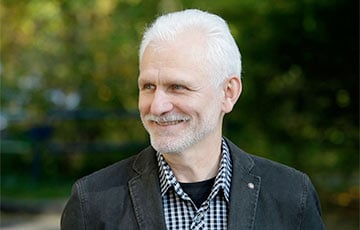Ales Bialiatski: Viasna Will Be With Belarusians Always
2- 26.04.2016, 15:12
- 11,725

PHOTO: FACEBOOK
April 26, 1996 is considered to be the day when the human rights initiative Viasna-96 (Spring-96), which later turned into the Viasna human rights centre, was founded.
On this day activists got together and organised cooperation for search of detained participants of the rally Chernobyl Way – 1996.
The events of the spring – 1996 were described in his memoirs by the chairman of the human rights centre Ales Bialiatski.
– The spring in 1996 will be remembered by a number of large-scale events which had been held in “conscious” Minsk, a riot of discontented Minsk dwellers.
In spring of 1996 Lukashenka decided to give fight to street democracy. And while rallies on March 15 (The Day of Constitution), March 24 (Independence Day) and April 2 (protests against the union state agreement) passed relatively calmly, on April 26, Chernobyl Way rally, policemen received permission for violence.
On April 26-27 several hundreds of people were arrested. Yury Khadyka and Viachaslau Siuchyk were thrown in the remand prison, they went on a hunger strike, which lasted three weeks, until they were released by Lukashenka under pressure of Yeltsin.
On April 27 almost all leadership of the Belarusian Popular Front was arrested. Yury Khadyka, Viachaslau Siuchyk, Liavon Barshcheuski, Vintsuk Viachorka, Viktar Ivashkevich and others were kept behind the bars. There was an impression that the new wave of repression could start, and we could follow the arrested. But in a few days the authorities yielded, and Viachorka and Barshcheuski were released.
We were to put something to this state violence. Soon on my initiative a group of people was assembled in the BPF (BNF) headquarters, it included Halina Vashchanka, Maya Kliashtornaya and some others, and they started urgent actions to collect information about the detained, and to help their families. Soon this assistance, foodstuffs (pasta, butter, cereals) were given to me by one of my good acquaintances, whose name cannot be revealed yet. In the Bahdanovich museum me and museum workers packed these foodstuffs in plastic bags with the museum’s logo, and then handed out to families of the victims. Families of imprisoned Yury Khadyka and Viachaslau Siuchyk received a considerable pack of products, for example.
Since 1996 I keep a copy of an application for a picket near the General Prosecutor’s Office of Belarus, signed by me and one more Minsk deputy Uladzimir Nestsierau, where we asked to give an authorization for a picket on August 28, from 11 a.m. till 4 p.m. and which would be called “Stop persecution of citizens on political grounds.” The authorities were frightened by the activism of the society and started to hinder even purely cultural actions. Thus, on May 25, on the day of Maxim Bahdanovich’s memory, several persons were detained during a traditional performance and musical show near his monument. The event was traditionally organised by the museum. A report was drawn up against me, a director of the Maxim Bahdanovich museum then, as an organiser of an “unsanctioned rally,” and there were attempts to convict me.
That was the beginning of the activities of the human rights centre Viasna. I also created a chronicle of crackdown, its first variant was published in the book Minsk Spring-96, and then it regularly appeared in Belaruskiya Vedamastsi, published by Zianon Pazniak in exile. Documentation of human rights violations became one of the main tasks.
On June 15, 1999 the organisation was registered as the public association Human Rights Centre Viasna (Spring). It is a republican public association with headquarters in Minsk and with regional branches in most of the major cities of Belarus.
By the decision of the Supreme Soviet of Belarus for participation in observation at the presidential elections in 2001, the human rights centre Viasna was unlawfully deprived of state registration on October 28, 2003, and on March 6, 2004 it became a member of the International Federation for Human Rights (FIDH).
“20 years of Viasna mean 20 years of the contemporary history of Belarus. Everything that was happening with our organisation, its ups and downs, its tragic and joyful moments – is inseparably connected with our history.
Today Viasna is a part of our social and historical process. It means more than just an NGO. One could say that Viasna is more than a human rights centre.
The main strategic direction of our work remains the same, and we are going to hand on our society, to live the life of our Belarusian nation. It means that its moments of success and failure are to be our success and problems – Ales Bialiatski said in an interview to charger97.org.
The editorial office of charter97.org congratulates Viasna with its 20th anniversary and wishes a really spring energy and achievements in human rights activities.









